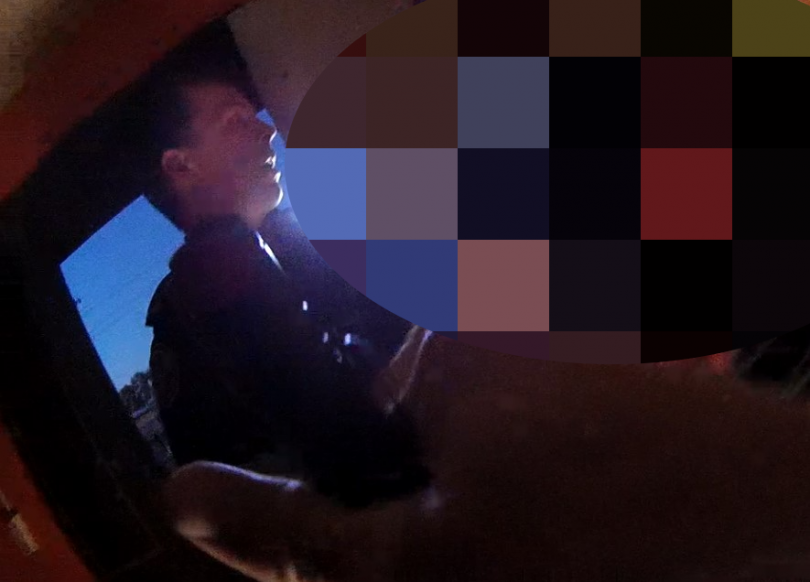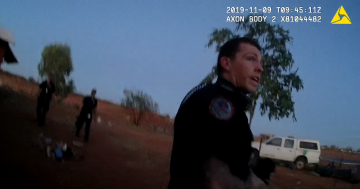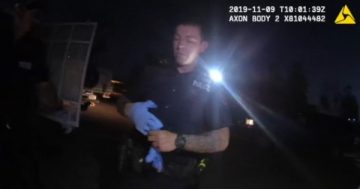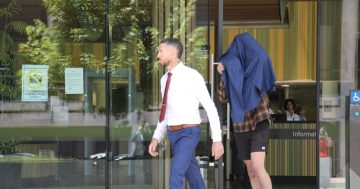
Constable Zachary Rolfe, pictured in body-worn camera footage before the shooting. The footage has been tendered to the court. Photo: Supplied.
Readers are advised this article contains content some may find distressing.
The police officer who struggled with Kumanjayi Walker when Constable Zachary Rolfe shot him said he did not feel the young Indigenous Australian man strike him with scissors before the shooting as he was trying to get him under control.
Mr Rolfe, 30, is currently facing a jury trial in the Northern Territory Supreme Court. He is accused of murdering 19-year-old Mr Walker in the small desert community of Yuendumu, outside Alice Springs, on 9 November 2019.
Remote Sergeant Adam Eberl was in the immediate response team, alongside Mr Rolfe, that went to the community to arrest Mr Walker for breaching a court order. He testified to the jury on Tuesday and Wednesday (22 and 23 February).
He and Mr Rolfe had gone into a house on the night of 9 November 2019 where they found Mr Walker. He allegedly stabbed Mr Rolfe in the shoulder with a pair of scissors and Mr Rolfe shot him once.
Sergeant Eberl got into a struggle with Mr Walker and the Crown alleged Mr Rolfe fired two shots into him when he was “effectively restrained” on the ground.
On Wednesday, Crown Prosecutor Philip Strickland SC asked Sergeant Eberl whether he saw or felt Mr Walker striking him with the scissors, although he said he could only tell they were a sharp object during their struggle.
“No, I did not,” he replied.
Under questioning from Mr Rolfe’s barrister David Edwardson QC, Sergeant Eberl said he was trying to control Mr Walker so he could not stab him.
He said his primary focus was getting Mr Walker on the ground, arresting him and protecting himself from being stabbed.
Mr Edwardson asked if he had the opportunity to call out something like “put scissors down” before the shooting.
“I could’ve said that, but that’s not what happened, no,” he said.
Mr Edwardson said it had been a matter of seconds between the three shots.
“You’re trying to control this man who is resisting police,” he said.
“He’s completely and utterly non-compliant.”
Sergeant Eberl told Mr Walker, “Don’t f-k around, I’ll f-king smash you mate”, after the three shots were fired.
Under questioning from Mr Edwardson, he said this was because Mr Walker was still doing what the barrister described as “f-king around” and was not yet incapacitated.
He said when the struggle began, he took hold of Mr Walker’s arm and hit him in what is called a “distracting strike” to stop him resisting. He also saw a sharp object, which he would later learn to be scissors, in Mr Walker’s right hand.
While they were standing up, his thoughts were to “try and take the defendant down”, and he did pull him to the ground onto a mattress.
The second and third shots were fired over about two-and-a-half seconds.
Sergeant Eberl said he had been “trying to restrain him on the ground” and was putting his weight on his left arm so he couldn’t turn, but did say Mr Walker’s right arm was underneath his body.
Mr Strickland asked if he saw or felt Mr Walker move his right arm in the time between when they landed on the mattress to when the third shot was fired, but he said he couldn’t remember.
Referring to the shots, Sergeant Eberl asked Mr Rolfe, “Did you? F-k”.
He said he was asking Mr Rolfe whether he shot Mr Walker because he “didn’t realise that [Rolfe] had shot him”.
On Tuesday, the so-called ‘axe incident’ was raised. This was when two officers tried to arrest Mr Walker on 6 November 2019, and he armed himself with a hatchet, tried to attack them and escaped. No one was injured.
Sergeant Eberl was asked if he and Mr Rolfe ever discussed the incident. He reported that he had, and Sergeant Eberle said he was “surprised they didn’t use the firearm”.
Mr Rolfe has pleaded not guilty to a charge of murder, as well as alternative charges of manslaughter and committing a violent act causing death.
The trial continues before Justice John Burns.

















